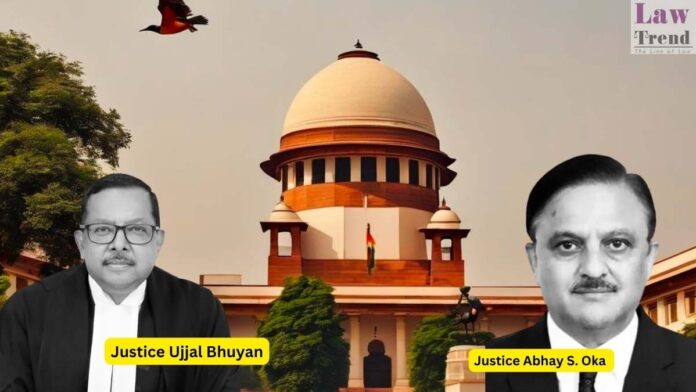In a significant judgment interpreting the Bharatiya Nagarik Suraksha Sanhita, 2023 (BNSS), the Supreme Court on Friday quashed a Special Court’s order taking cognizance of a money laundering complaint, holding that the accused was not granted a mandatory opportunity of being heard as required under the new law.
A Bench comprising Justice Abhay S. Oka and Justice Ujjal Bhuyan ruled that under the proviso to Section 223(1) of the BNSS—applicable from July 1, 2024—a magistrate or special judge must hear the accused before taking cognizance of offences under Section 44(1)(b) of the Prevention of Money Laundering Act, 2002 (PMLA).
Background
The appeal arose from the Special Court’s order dated 20 November 2024, which took cognizance of a complaint filed by the Enforcement Directorate (ED) under Section 44(1)(b) of PMLA. The Supreme Court found that the Special Court had failed to provide the accused an opportunity to be heard before taking cognizance, a right introduced for the first time by Section 223(1) of the BNSS.
Previously, under the Code of Criminal Procedure, 1973, no such requirement existed. However, in light of BNSS now being in force, the Supreme Court emphasised that this procedural safeguard must be followed.
“In this case, admittedly, the opportunity was not given to the accused by the learned special judge before taking cognizance of the offence alleged in the complaint. Only on that ground, the order dated 20th November 2024 will have to be set aside,” the Court held.
Legal Analysis
The Bench referred to its earlier decision in Tarsem Lal vs Enforcement Directorate, which clarified that complaints filed under Section 44(1)(b) of the PMLA are governed by Sections 200 to 204 of the CrPC, and therefore, now by the corresponding provisions in Chapter XVI (Sections 223 to 226) of the BNSS.
The proviso to Section 223(1) of BNSS expressly states that no cognizance of an offence shall be taken without first giving the accused an opportunity of being heard.
Arguments and Court’s View
Additional Solicitor General S.V. Raju made two submissions:
- The hearing under Section 223(1) should be limited to determining whether a case is made out on the basis of the complaint and the documents submitted.
- Cognizance is taken of the offence, not the offender, and once taken in compliance with Section 223(1), it need not be repeated for supplementary complaints.
The Court, however, did not examine these arguments, stating:
“These submissions need not be considered as the same do not arise in this appeal at this stage. They are left open.”
The ED had earlier argued that since the investigation was completed before the BNSS came into effect, the requirement of pre-cognizance hearing should not apply. However, the Bench noted that this argument was not pressed during the current hearing.
Directions
The Supreme Court directed the appellant to appear before the Special Court on 14 July 2025, so that the requirement under the proviso to Section 223(1) BNSS could be fulfilled.




